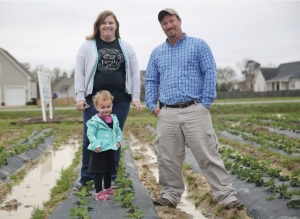Family opens a classroom on its farm
By Phyllis Moore
Published in News on March 31, 2015 1:46 PM

News-Argus/MELISSA KEY
J.R. Odom and his wife, Emily, and daughter Reese, 2, stand in the strawberry field on their family farm, Odom Farms, in the Rosewood community. Not pictured is their son James, 6.
When J.R. Odom was deciding on a career, he had to look no farther than his own back yard.
"I grew up on this farm," he said of the tract of land in Rosewood known as Odom Farms. "This was my grandfather (Charlie Odom's) farm and I have farmed it since."
The family farm is something he hopes to one day pass on to his own children. He and wife, Emily, are parents to James, 6, and Reese, 2.
The Odoms have found a creative way to make their farm more productive -- through education. They give agricultural tours, mostly to school-age children.
"We have kids come out to our farm all the time," Odom said.
The field trips started a few years ago, with requests to visit and see the Odoms' strawberry fields.
"We started this when James was 2," Odom said. "The whole farming operation, he's been a big part of it. Groups would come. He'd just latch onto them.
Odom said he quickly discovered a "disconnect" among children who had never been on a farm or seen a vegetable in its original state.
"You would see that there was really a need to educate the kids on where the products come from that they consume daily," Odom said. "Kids don't understand where the food comes from."
In an agriculture-rich community like Wayne County, there is no excuse for children not knowing where food comes from before it reaches the shelves and then their plates, the couple says.
Odom is part of a group that formed a Young Farmers and Ranchers chapter in Wayne County last year, which led to a concept pitched to the school district.
"The Young Farmers and Ranchers, with the Farm Bureau Association, had an idea (for students to see) firsthand where their food came from," said Carol Artis, director of elementary education for Wayne County Public Schools.
She called it an "exciting" proposal, being able to tie in the instruction into such curriculum areas as science and math.
The First "We Dig It: Ag Day" was last March at the Odoms' farm on Claridge Nursery Road.
"We designed it around the second-graders. We had a great day," Odom said. "About 1,500 of them came that day. They all were super excited and they had a great time."
The farm was set up in such a way that students would rotate through 12 stations -- from cotton and horticulture to livestock and honeybees.
"We also integrated the FFA (Future Farmers of America) chapters throughout the county and they brought so much to the table," Odom said. "They did a presentation and the kids, they picked up what they gave them."
After such an experience, the potential to continue learning about agriculture is great, he said.
"It went like the further we got into it, the (light) bulb just gets brighter and brighter," he said. "If the teachers and the parents kind of nurture that, (students will) do their own research and understand for themselves."
The second annual "We Dig It: Ag Day" is planned for this Thursday.
The Odoms also expanded the event this year to gain more community support, Mrs. Odom said.
"We also got almost every agribusiness in Wayne County to support it, to make sure this is a free event for the kids," she said.
Each student attending the program will not only be exposed to information and a better understanding of where food products originate and what they look like as they grow, but the take-away is more than just a better awareness of the subject.
"The kids get to go home with a lunchbox, seed packets, coloring books, and the teachers go home with a book, 'How Did That Get in My Lunchbox?'" Mrs. Odom said.
"I don't just want kids to come out to the farm and entertain them and for them not to carry a little piece of education with them," her husband added. "We try to get every piece of the puzzle in there."
Teachers also get their own handouts, including a vocabulary sheet and a link to the Farm Bureau.
"We send home information with the teachers so that we know that they'll get support before and after they come to the farm," Odom said.
